His second year with the Saints saw him manage to post a winning record, having improved by 13 wins to 23-21 while lowering his goals against average to 2.73.
LoPresti improved by another 6 games in 1939-40 with a noteworthy 29-18 record while lowering his goals against average yet again to 2.55, thanks in part to 4 shutouts. He then went on to post a 6-1 record in the AHA playoffs with a 1.29 goals against average as St. Paul defeated the Omaha Knights to win the league championship.
During the season, LoPresti caught the attention of Chicago Black Hawks president Bill Tobin and head coach Paul Thompson during an exhibition game between the two clubs. He was signed by Chicago for the 1940-41 season and assigned to the Kansas City Americans, also of the AHA.
After 18 games with Kansas City, LoPresti was recalled by Chicago when goaltender Paul Goodman retired in mid-season. LoPresti made his NHL debut on January 5, 1941 and went unbeaten in his first four starts, a 2-2- tie against the Boston Bruins in his debut followed by wins over the New York Rangers, Montreal and Detroit. After a defeat by Montreal, the Black Hawks tied Boston again and then defeated the New York Americans and the Rangers, making LoPresti an impressive 5-1-2 in his first seven games and having taken the Black Hawks from a losing 7-10-4 to now a winning 12-11-6.
It couldn't last though, as Chicago had the second worst offense and third worst defense in the then seven team NHL and they proceeded to lose seven of their next eight with only back-to-back wins over the moribund Americans providing some eventual relief.
After losses at Montreal and the Rangers, LoPresti earned his first NHL shutout when he blanked the Red Wings 1-0 on February 27th.
Then came a home and home series with the Bruins. The first game in Chicago on March 2nd was a close game, but the Bruins prevailed 4-3.
The clubs reconvened on this date in 1941 in Boston. LoPresti was immediately under siege from the powerful Bruins, who were on their way to a first-place finish. The Bruins pelted the rookie goaltender with shot after shot, only to see him turn away one after another. LoPresti made 27 saves in the first period alone.
He faced an even greater onslaught in the second period when the Bruins pressured him with 31 more shots, but still LoPresti held off the attack as best he could. Roy Conacher finally beat him for the first Bruins goal on Boston's 42nd shot.
With the game tied at 2-2 late in the third period, the Bruins Eddie Wiseman scored for Boston, and despite facing another 22 shots, Chicago fell 3-2 despite LoPresti making an NHL record which still stands to this day of 80 saves in a regulation 60 minute game. LoPresti's effort was not lost on the Bruins crowd, who gave him an ovation for his stellar effort despite the loss.
Of note, the Bruins winning goaltender was Frank Brimsek, not only a fellow American in an age when players from the United States were a rarity, but one who also hailed from tiny Eveleth, Minnesota. Brimsek made 18 saves on 20 Chicago shots, less than a quarter of what LoPresti faced.
"The Bruins didn't get the winning goal until the end of the game, " LoPresti recalled later on. "Wiseman got it on a rebound. But we couldn't do anything right from the opening faceoff. Just couldn't move the pick out of our zone. They were shooting from every angle and I didn't see half the shots. They were bouncing off my pads, chest protector, my arms, my shoulders. I didn't even know where they were coming from. I lost between eight and ten pounds that night."
No NHL goaltender since that night has faced more than 73 shots.
Chicago would finish the season with a tie against the Americans followed by three consecutive losses to finish with 39 points from a 16-25-7 record, good for fifth in the league. Despite their losing record, the format that season called for six of the seven teams to make the playoffs. In the Quarterfinal round, Chicago defeated the Canadiens 2 games to 1, with each game being a close, one goal margin. Detroit then eliminated the Black Hawks in two straight.
LoPresti returned to Chicago for the 1941-42 season and put together a record of 21-23-3 with a 3.19 goals against average with 3 shutouts while playing in 47 of the Black Hawks 48 games. Chicago finished mid-pack and were paired with the Bruins in the playoffs, who defeated them 2 games to 1, with the Black Hawks win being a shutout for LoPresti.
He then enlisted in the United States Navy during World War II and was assigned to the SS Roger B. Taney, which protected ships as they crossed the Atlantic. The Taney was torpedoed and sunk in February of 1943 and LoPresti was listed as missing in action, thought to be a casualty.
However, as the Taney sank, LoPresti and 25 other men abandoned the ship and sought safety on rafts. The next morning, those on the rafts were picked up by the #4 lifeboat, but with minimal food or water. The lifeboat then made an incredible, nearly 2,500 mile voyage to the South American coast. LoPresti in particular was credited with saving the men's lives by fashioning a weapon by lashing a knife to a boat hook. He then dove into the water and was able to catch a 35 pound dolphin, which provided blood to drink and meat, which they cooked in a metal bucket with a fire made of rags and kerosene. The men were finally rescued off of the coast of Brazil 42 days after their ship sank. LoPresti had lost 55 pounds during the time he was lost at sea.
After he returned from the war, LoPresti played. for the San Diego Skyhawks of the Pacific Coast Hockey League in 1943-44 and 1944-45. He then returned to Minnesota and continued to play senior hockey with the Duluth Coolerators, Duluth Steelers and finally two seasons with the Eveleth Rangers, where he was named the North American Hockey League MVP in 1950. LoPresti was a charter member of the United States Hockey Hall of Fame in 1973.
His son Peter LoPresti also played in the NHL for the Minnesota North Stars from 1974-75 through 1978-79.
Today's featured jersey is a 1940-41 Chicago Black Hawks Sam LoPresti jersey as worn during the season he set the NHL record for Most Saves in a Regulation Game with 80 on this date in 1941.

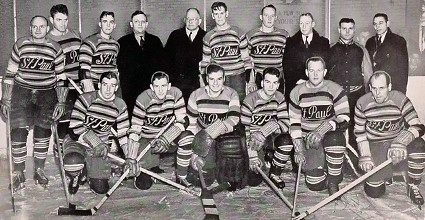

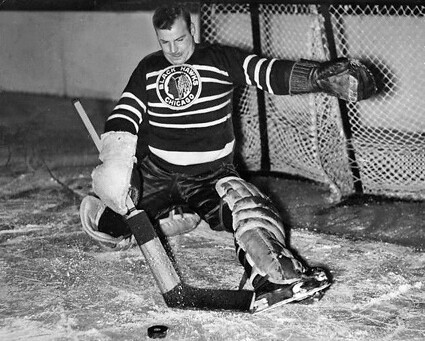
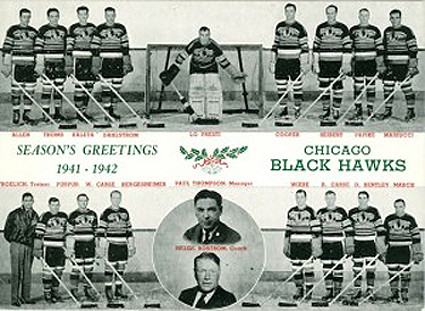
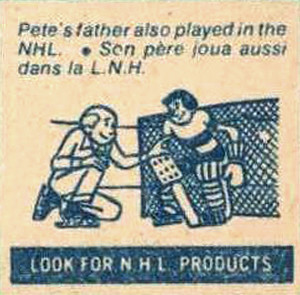
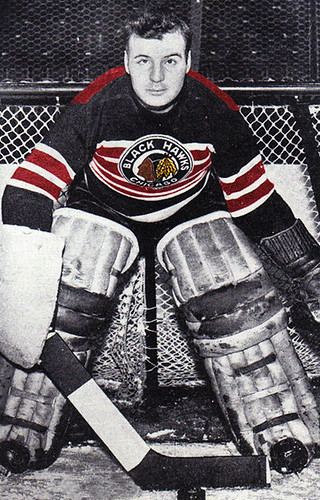










No comments:
Post a Comment
We welcome and encourage genuine comments and corrections from our readers. Please no spam. It will not be approved and never seen.